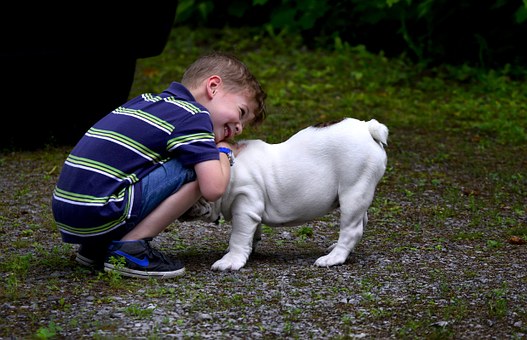 Raising a compassionate boy in today’s world isn’t easy, especially with role models who value aggressiveness over understanding, and dominance over compassion. Our boys are faced with many stressors that do not promote empathy and gentleness toward others. Societal norms and gender stereotypes often get reinforced at an early age, such as boys are more active, physical and less relational; and girls more compliant and prosocial. Family expectations also may impact a boy’s comfort expressing a range of feelings and showing kindness. Thankfully, through reflection, awareness and shifts in our thinking and response to boys, we can provide the models they need for them to develop into genuine and nurturing young men.
Raising a compassionate boy in today’s world isn’t easy, especially with role models who value aggressiveness over understanding, and dominance over compassion. Our boys are faced with many stressors that do not promote empathy and gentleness toward others. Societal norms and gender stereotypes often get reinforced at an early age, such as boys are more active, physical and less relational; and girls more compliant and prosocial. Family expectations also may impact a boy’s comfort expressing a range of feelings and showing kindness. Thankfully, through reflection, awareness and shifts in our thinking and response to boys, we can provide the models they need for them to develop into genuine and nurturing young men.
When my son was young, he had many anxieties. He was especially afraid of children’s movies, crowds and unfamiliar situations. Taking him to the movie theater was out of the question, and movies at home were hit and miss. When afraid, he would put his hands over his ears, scream and run out of the room. My instinct – or expectation – was for him stay in the room and work through his fear. I remember on one particular occasion, I voiced this when my son had a strong reaction to a scene in a movie. My husband looked at me, confused, and said, “Why can’t he feel his feelings? Why are you trying to change how he feels?” This was a pivotal moment, both in my awareness of my expectations as a parent, automatic response to my son’s worries, and deep appreciation for my husband’s guidance and acceptance of my son’s range of feelings and expression.
Parents who model emotional expression and communicate (verbally and nonverbally) that all feelings are important and valuable, not only promote empathy and compassion, but also build confidence and a strong sense of self in their kiddos. From then, my husband and I started to do things differently. When our son got scared while watching a movie for example, we simply turned off the sound or put the film in slow motion. Slowing/breaking things down in general allowed him to feel safe, feel his feelings and tolerate all the stimulation coming his way. He in turn felt seen and heard, supported and developed confidence mastering moments of anxiety.
How do we increase these moments where our boys can feel safe, understood and work through upsetting emotions? First, we can reflect and deepen our understanding when our boys become emotional, and respond with kindness and compassion.
- Work on you first so you can truly be compassionate with your son. The first step as parents is to work on our own feelings and expectations. Sharing with others the hardships and successes in parenting will build compassion for ourselves. We are not going to get it right every time, and there is always opportunity to reflect and grow. Be gentle with yourself! Also, try and see things from your boy’s perspective. What he wants more than anything is to feel fully loved and accepted, and to know that he is good enough exactly as he is.
- Strengthening your bond with your son will help him feel safe to share a range of feelings. Carving out 10 to 20 minutes each day to play with your boy with undivided attention will transform your relationship. Create a “no electronics” zone and have all family members put their devices in a bucket during this time. By doing this, you will communicate how important your boy is; how you value this time together more than anything else; and that special time together without distraction is a priority. This is critical with so much access to distraction all around us.
- Play and laughter releases energy and builds connection. What makes your boy laugh? Laughter releases the same stress hormones as tears. The more
 you laugh with your son, the more connected he will feel to you, and the more likely he will show you his feelings.
you laugh with your son, the more connected he will feel to you, and the more likely he will show you his feelings. - Be explicit about allowing feelings. Acknowledge his emotions and name them. Don’t try to change them. Feelings will arise no matter what – they need to be honored and valued. Be clear that all feelings are okay; and that your son can choose his behaviors: “You are mad, but we don’t hit.” This will build his emotional literacy and keep him from stuffing his feelings. It is also helpful to comment on feelings in general:“That boy is crying….he is sad and mad at his mom…you can love someone and be mad at them at the same time.“
- Avoid power struggles. The effort to avoid a power struggle will pay off – in more ways than you know. Power struggles take two people, so if you sidestep them, there won’t be any. This will take a shift in attitude from you, of course. In each case when you feel your heels dig in, ask yourself if it really matters. If it does, see if you can find a way to give your son some power in the situation. You can ask your son to help you (“Sweetie, we have a problem. It is time to leave; it’s cold and it’s raining; and you don’t have your shoes on yet. What should we do?“), engage in fun-loving competition (“Let’s see who can brush their teeth first!”), ask him to be the leader (kids love that), offer a choice, and always connect before you redirect.
- Welcome fear. Your son may have fears to express, similar to my son. When kids feel fear, they may have a strong reaction, such as wanting to run away or lash out. They may push against you, and that is okay. Try not to push back, just to provide resistance. If he lashes out, keep yourself from getting hurt by letting him push against your hands or use a pillow to hold in front of you. Most important is to stay connected by using a warm, compassionate, soothing voice; don’t analyze or even say much, except to reassure him that you are there and he is safe. Usually, after kids get some of their fear out, they collapse in your arms and want to reconnect. This teaches our boys to feel their feelings, that you and your boy can tolerate them, and that they can calm down and get centered again.
How do we raise compassionate boys? The good news is that you don’t have to change anything for your son to “feel” his emotions. All you have to do is understand how you feel about a range of feelings, shift your attitude and mindset that all feelings are okay, important and valuable, and respond to your son with warm compassion, acceptance and adoration, even when all his mixed and ever changing feelings arise. With that unconditional love, he will open up to experience himself fully, develop confidence in who he is, trust his experiences and intuition, and he will thrive into a kind young man.
By Jennifer Porter, M.A., Ed., AMFT Associate Counselor at Therapy2Thrive counseling center in Pleasanton

